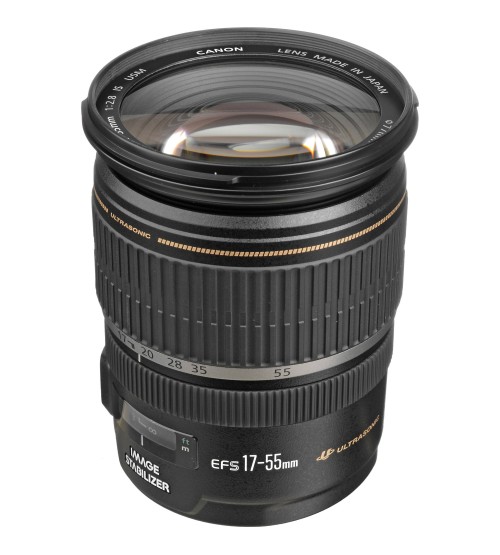|
The Canon EF-S 17-55mm
f/2.8 IS USM Lens, with a fast, fixed f/2.8 aperture, very high image
quality, 3-stop Image Stabilization and a very popular focal length range, is
one of the best general/multi-purpose lenses available. Since EF-S lenses
only mount on Canon EF-S bodies - which all feature a 1.6x FOVCF - the
17-55mm focal length range always equates to the field of view of a 27.2-88mm
lens mounted on a full-frame Digital SLR. This range covers what I consider
to be the most important focal lengths for a Canon general purpose lens. This
is a focal length range that can be used for everything from a wide scenic
landscape to a relatively-close portrait. Interesting is that Canon already
had these focal lengths similarly covered in their econo kit lens - the Canon
EF-S 18-55mm f/3.5-5.6 Lens. Reality is that these are vastly different
lenses - in build, optical and feature qualities - and price. The kit lens is
a good value for the money, but does not compare with the Canon EF-S 17-55mm
f/2.8 IS USM Lens. Canon already had a superset of the 17-55mm focal length
range covered with the Canon EF-S 17-85mm f/4-5.6 IS USM Lens. This lens has
a higher build quality, image quality and feature set than the EF-S 18-55 -
adding Ring USM and 3 stop image stabilization to the feature set. What the
Canon EF-S 17-55mm f/2.8 IS USM Lens adds to the 17-85`s feature set is a
fixed f/2.8 aperture and L-Series grade UD (Ultra-Low Dispersion glass) lens
elements. Of course, price, size, weight and a reduced focal length range are
the downsides of the 17-55 compared to the 17-85.
With a fixed fast f/2.8 aperture (meaning the widest aperture
opening is f/2.8 through the entire focal length range - f/22 is the
narrowest setting), exposure settings do not change when zooming in on a subject.
To some, this is not a big deal - to me, this is a great feature. F/2.8 is as
fast as any Canon zoom lens currently made. It is fast enough to stop action
in many indoor venues (higher ISO settings typically required - fast action
indoor sports may require f/2 or wider). This wide aperture also activates
the higher autofocus sensitivity mode for certain focus points in many Canon
bodies (f/2.8 does not have to be selected to get the benefit of this
feature). F/2.8 also presents a bright viewfinder to the user. Combining an
f/2.8 aperture with the 3 stop image stabilization, the Canon EF-S 17-55mm
f/2.8 IS USM Lens is arguably the most handholdable lens Canon currently
makes. Image stabilization will allow a shot to be taken at a shutter speed
up to 3 stops slower than without IS. Sorry, but it will not stop subject
motion. This IS version is tripod sensing to prevent feedback loops between
the IS sensor and stabilizer motor vibrations. The manual recommends turning
IS off when tripod-mounting the lens (to save battery life) or when panning
(panning mode IS is not available). Leave IS on when handholding or shooting
from a monopod. The IS implementation on this lens is very well behaved - it
is quiet and does not cause the image to jump when starting up.
With Ring USM (Ultrasonic Motor), the Canon EF-S 17-55mm f/2.8 IS USM Lens
focuses very quietly and very fast. Focus accuracy has been very good for me
(an equally or even more important fact). FTM (Full Time Manual) focusing is
a very nice feature of this lens. The focus ring is rather small, but turns
easily. Likely to get far more use is the zoom ring - it is very nicely sized
and turns smoothly with little effort. The AF and IS switches are recessed to
prevent accidental changes. Canon claims that `By optimising Super Spectra
lens coatings and lens element shaping, Canon’s engineers have been effective
in suppressing flare and ghosting more prone to occur with digital cameras
due to reflection off the image sensor. By increasing light absorption, coatings
reduce reflections off lens element surfaces to deliver crisp, undistorted
images with natural colour balance.` In reality, I am finding the Canon EF-S
17-55mm f/2.8 IS USM Lens to be somewhat flare-prone if the sun or bright
light is in the frame. Otherwise, contrast is very nice. Pictured above
installed from left to right with hoods in place are the Sigma 18-50mm f/2.8
EX DC Lens, Tamron 17-50mm f/2.8 XR Di II Lens and Canon EF-S 17-55mm f/2.8
IS USM Lens. The same lenses are pictured fully extended below. Prior to
receiving my Canon EF-S 17-55mm f/2.8 IS USM Lens, I stated that I expected
its image quality to match or nearly match that of Canon`s L Series Lenses as
it shares the L-Series UD lens elements. As it turns out, my 17-55 matches or
exceeds the optical performance of my L-Series zooms in this similar focal
length range ...
This lens is sharp! Wide open and from edge to edge. Unless the distance is
close that is - I`m finding that close subjects do not produce the same image
sharpness as normal distance subjects. The ISO 12233 chart test results
indicate this as well. The Canon EF-S 17-55mm f/2.8 IS USM Lens shows slight
sharpness improvement at f/4, but performance at f/2.8 is very good. Though I
have not compared it directly to the Canon EF 24-105mm f/4 L IS USM Lens, the
17-55 compares favorably with any other current Canon EF or EF-S zoom lens in
this focal length range. My Canon EF 16-35mm f/2.8 L USM Lens is slightly
sharper in the center at 17mm wide open, but the Canon EF-S 17-55mm f/2.8 IS
USM Lens is sharper at all other tested focal lengths - and proved much
sharper in the corners at all focal lengths and apertures. Distortion was
also less on the 17-55. In my opinion, the only reasons to buy the 16-35 over
the 17-55 are for full-frame compatibility (a big reason), better build
quality and environmental sealing (EF-S compatible bodies are not weather
sealed at this time). Similar story with the Canon EF 17-40mm f/4 L USM Lens.
The Canon EF-S 17-55mm f/2.8 IS USM Lens is sharper at all other tested focal
lengths - and proved much sharper in the corners at all focal lengths and
apertures. At close distances, the 17-40 had sharper corners and held its
sharpness to a narrower focal length than the 17-55. Lower barrel distortion
at the wide end is also in the 17-55`s favor. Full-frame compatibility (a big
reason), better build quality and environmental sealing are in the 17-40 L`s
favor. I suspect the wider price discrepancy between these two lenses will
keep sales of the 17-40 L going stronger than for the 16-35. Distortion is
present over most of the focal length range. Mild barrel distortion is
present until about 24mm where pincushion distortion becomes present through
55mm. Your spouse will appreciate how the 17-55 makes them look thinner at
the longer focal lengths (use this excuse if you need help getting spousal
purchase permission). Being a wide aperture, wide angle lens, expect to see
some vignetting from the Canon EF-S 17-55mm f/2.8 IS USM Lens. The amount of
vignetting is less than I anticipated - basically visible only in the corners
at f/2.8 when photographing an even-colored subject such as a blue sky. One
of the benefits of using an EF lens on an EF-S body is that much of the lens
vignetting is not apparent within the cropped field of view.
|
Focal Length & Maximum Aperture
|
17-55mm 1:2.8
|
|
Lens Construction
|
19 elements in 12 groups
|
|
Diagonal Angle of View
|
78°30` - 27°50`
|
|
Focus Adjustment
|
AF with full-time manual
|
|
Closest Focusing Distance
|
1.15 ft. / 0.35m
|
|
Filter Size
|
77mm
|
|
Zoom System
|
5-group helical zoom (front group moves: 27mm)
|
|



